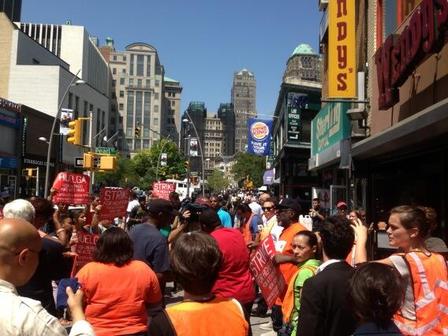In the biggest strike yet in the growing fast-food/low-wage workers’ actions demanding a voice, thousands of workers making the minimum wage or just slightly more walked off the job in several cities today, demanding a living wage, no retaliation for striking and the right to join unions.

The walkouts are taking place in Chicago; Detroit; Flint, Mich.; Kansas City, Mo.; Milwaukee; New York City; and St. Louis and include workers from McDonald’s, Burger King, Wendy’s and KFC and from retail stores like Macy’s, Victoria’s Secret and Dollar Tree.
At a Midtown Manhattan McDonald’s, several dozen workers and their allies filled the sidewalk and chanted:
No more burgers. No more fries. Make our wages super-sized.
In St. Louis, Rep. Lacy Clay (D-Mo.) and Rep. Hank Johnson (D-Ga.) joined workers and community, faith and other activists picketing a McDonald’s. See the video of the action below.
Jonathan Westin, director of Fast Food Forward, told New York's 1010 WINS radio station.
A lot of the workers are living in poverty, you know, not being able to afford to put food on the table or take the train to work. The workers are striking over the fact that they can't continue to maintain their families on the wages they're being paid in the fast-food industry.
Stand up to @Wendys @McDonalds @BurgerKing and more. Tell them not to retaliate against striking workers http://t.co/XWJPA8jsz7 #strikefor15
— Low Pay Is Not OK (@LowPayIsNotOK) July 29, 2013
The strikes are being organized and supported by a wide coalition of labor, faith and community groups, including SEIU, Jobs with Justice, 99 Pastors and others.
Meanwhile, The New York Times’ Steven Greenhouse examines the growing fast-food/low-wage movement.
Many low-paid workers feel their employers have put an invisible ceiling on their wages, with little prospect of ever making more than $10 or $11 an hour, as corporations have focused on keeping wages competitive and maximizing profits to benefit shareholders. The richest Americans have benefited mightily from corporate America’s record profits and the stock market’s repeated highs.
He also writes that many corporations are following Walmart’s lead in cutting wages.
Many Walmart stores—as part of a new strategy to save on wages and benefits—are hiring only temps to fill job openings. Scores of companies are relying increasingly on part-timers, who typically get paid several dollars less per hour than full-timers.

